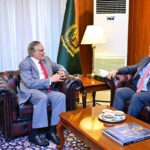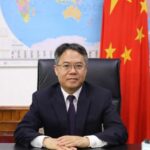PESHAWAR, Sep 07 (APP): With other socioeconomic sectors, education too has been adversely affected by the coronavirus pandemic in Pakistan where the dropout ratio of students aged six to 16 years swelled to around 20 million including about 800,000 in KP.
Following an outbreak of the coronavirus since March last year, the rate of dropout students had increased in all provinces of the country where around 20 million children including 8 lac in KP mostly belonged to poor families including laborers, farmers, daily wagers, orphans, widows and low income groups have left schools for search of jobs to support their underprivileged parents during testing time of the pandemic.
“The drop out of students has increased in KP due to COVID-19 where around eight lac children are out of schools today.
Most of these poor students have started jobs in different sectors to support their poor families and bringing them back to schools was a big challenge,” said Shahram Khan Tarkai, Provincial Minister for Education while talking to APP.
He said the Khyber Pakhtunkhwa Government under the Prime Minister’s Education for All Program (PM EFA) has launched a second shift in 120 schools including 76 boys and 44 girls from September 1st to bring these children under school net.
The second shift was started initially in 16 settled districts including Abbottabad, Bannu, Charsadda, Chitral Lower, Chitral Upper, DI Khan, Dir Lower, Hangu, Haripur, Lakki Marwat, Malakand, Mardan, Nowshera, Shangla, Swabi and Swat.
The Minister said tangible efforts were being made to enroll all these eight lakh children by September 15.
In the second phase, he said more schools would be included in the 2nd shift especially girls schools in the far flung and remote districts of KP, adding the second shift was started for students of primary, middle, high and higher secondary schools.
The Minister clarified that the second shift was started only in settled districts and not in merged areas at the moment keeping in view of less strength of students in schools there.
He said the government was spending a record about Rs 30 billion on strengthening of educational services including provision of furniture, construction of new schools, model classrooms, boundary walls, washrooms and other related services in merged areas’ schools.
The teachers, who opted to perform teaching in second shifts, would be given additional financial benefits, he said, adding the Parents-Teachers Council (PTC) had been assigned the task to help arrange teachers as a stopgap arrangement for the landmark program.
He said a record Rs.6 billion had been allocated for provision of furniture to Government schools that would directly benefit around two million children in the province.
As many as 50 new primary schools would be constructed in different districts at cost of Rs1,000 million while Rs1,000 million has been allocated for establishment of a cadet college at Bannu besides Rs.930 million for launching of digital literacy program under the PM EFA.
The Minister said 4,000 model rooms were being constructed in the province where 2,000 such rooms have already been built.
Besides allocation of Rs1,206 million for basic education community schools (BECS) and national commission for human development centres (NCHD), the KP Government would spend Rs1,000 million on improvement and management of poor performing schools by engaging the private sector.
As many as Rs17,581 million have been allocated for 126 elementary and secondary education projects including Rs16021.505 million for 104 ongoing and Rs1559.495 million for 22 new projects by the KP Government for the current fiscal year.
The mega ongoing projects includes establishment of 160 government primary schools (GPS) costing Rs2355.533 million, 1000 GPS costing Rs1699.072 million, reconstruction of 100 GPS amounting Rs855mn, cadet college at Lakki Marwat costing Rs777.245 million, five model schools one each in Karak, Haripur, Charsadda Hangu and Batagram, reconstruction of 760 earthquakes affected schools, 70 girls secondary schools costing Rs2621.031 million and Rs1000 million for development of schools at Peshawar in current financial year.
Under Prime Minister’s Ehsas education stipend program initially rolled out in 160 districts of Pakistan including KP, he said the primary school boy student
would get quarterly stipends of Rs1,500 and Rs .2,000 would be paid to a girl student.
The secondary school boy student would pocket Rs 2,500 and girl Rs3,000 while Rs 3500 for boy and Rs 4000 for girl student quarterly at higher secondary level.
Under Ehsaas undergraduate scholarship programme, the Government has announced 200,000 scholarships worth Rs 24 billion over 4 years to facilitate poor students including boys and girls nationwide in their education.
Over 142,000 scholarships have been awarded within two years under Ehsas program till date.
Ehsaas scholarship reserves 50 percent of its places for girls and women, covering 100% of tuition fees and additional stipend for essential living expenses and playing field for all students.
Terming Ehsas education stipends programme a landmark initiative of the Prime Minister in education sector, the minister said it provided the much needed financial assistance to poor and deserving households for education of their children at primary, secondary and higher secondary levels besides bolstering literacy ratio and science, IT , vocational education to all irrespective of colour, caste and creed.
Shahram Tarkai said the KP Government was providing 7,000 Rehmatul Lil Alameen scholarships to poor students.
Under the scholarship program for students of merged areas, KP Government would spend Rs 131 million during the current financial year besides Rs20 million for construction of cadet colleges in Haripur and Dir Upper.
Shahram Tarkai said launching of uniformed curriculum in the country was a historic achievement of the present government, which would end the educational gap between rich and poor besides providing a level playing field in competitive examinations.
The education turnaround during the last three years in Pakistan has been endorsed by the recent analysis report of the UK’s Times Higher Education (THE), the world leading universities ranking agency, which declared 21 Pakistani universities among the top universities in the world.
Acknowledged Pakistani universities’ strides in field of research, quality education and teaching over last three years, THE analysis stamped that Pakistan was one of the world’s fastest improving nations on a range of key metrics and was one of the top five of nations globally for significant improvements in research citations, international outlook and industry links besides it noticed an upwards trend in higher education performance during last three years.
THE has noticed str
ong growth of Pakistani universities in areas of Business & Economics, Physical, Life and Computer Sciences and declared international co-authorship of research was strong last year.
The Minister said the independent THE analysis has endorsed the remarkable achievements of the Government towards promotion of quality education, research, IT and professional development of faculty and students during the last three years.






